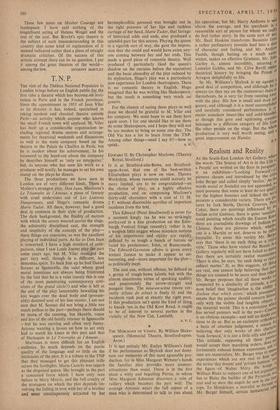T. N. P.
THE visit of the Thatre National Populaire to London brings before an English public for the first time a theatre which has become an insti- tution in. Paris and in the French provinces. Since the appointment in 1951 of Jean Viler as its director it has, indeed, specialised in taking modern and classical theatre outside Paris—an activity which anyone who knows the small French town will applaud. M. Viler has built up .a considerable organisation in- cluding regional drama centres and arrange- ments for theatrical weekends and discussions as well as the main company based on the theatre in the Palais de Chaillot in Paris, but he is modest about his achievement. In his foreword to the hand-out about the company he describes himself as 'only an interpreter,' but, as anyone who has seen his work as a producer will testify, he manages to set his own stamp on the plays he directs.
The three productions we have seen in London are of very different kinds. There is Moliere's strangest play, Don Juan, Marivaux's Le Triomphe de l'Amour, a piece of fantasy with cruel undertones out of Les Liaisons Dangereuses, and Hugo's romantic drama Marie Tudor. All these, however, had a good deal in common in their style of production. The dark background, the fluidity of motion with which the actors weaved acr6ss the stage, the admirably disciplined cast, the strength and simplicity of the concept of the play— these things are constants, as was the excellent playing of individual parts. As far as Don Juan is concerned, I have a high standard of com- parison, since I saw Louis Jouvet play the part some years ago, but M. Viler managed the part very well, though in a different, less k. demoniac spirit. To back him up he had Daniel Sorano as Sganarelle, the valet whose good moral intentions are always being frustrated by the fact that he is a valet (surely this is one of the most penetrating contemporary criti- cisms of the grand siecle?) and who is left at the end of the play lamentably bewailing his lost wages over the dead body and (presum- ably) damned soul of his late master, I am not sure that M. Sorano did not bring a little too much pathos to the part—perhaps there should be more► of the cunning, but likeable, rogue and less of the old family retainer in Sganarelle —but he was moving and often very funny. Anyone wanting a lesson on how to act only had to watch his knees in this part and that of Harlequin in Le Triomphe de l'Amour.
Marivaux is more difficult for an English
t audience. So much depends on the poetic quality of the language and so little on the intricacies of the plot. It is a tribute to the TNP that they managed to get this pleasant trifle across the footlights. Maria Casares was superb as the disguised queen. She brought to the part a concealed force which 1 have only seen before in Mary Morris, and the full cruelty of the stratagem on which the plot depends (in- volving the falling in love with her of a brother and sister simultaneously attracted by her hermaphroditic persona) was brought out in the tight pressure of her lips and ruthless carriage of her head. Marie Tudor, that farrago of historical odds and ends, also produced a splendid part for this actress. Playing the queen in a tigerish sort of way, she gave the impres- sion that she could and would have eaten any- one coming between her and her ends. This made a good piece of romantic theatre. Well produced (I particularly liked the queen's shadow on the curtains before the execution) and the basic absurdity of the plot reduced by its stylisation, Hugo's play was a particularly new experience for London theatregoers. There is no romantic theatre in English. Hugo imagined that he was writing like Shakespeare, but the result is something very much sui generis.
For the chance of seeing these plays so well done we should be grateful to M. Viler and his company. We must hope to see them here again soon. I for one should like to see them do some Shakespeare, and I hope they will not be tpo modest to bring us some one day. The Old Vic has a lot to learn from the TNP. Among other things—need I say it?—how to










































 Previous page
Previous page